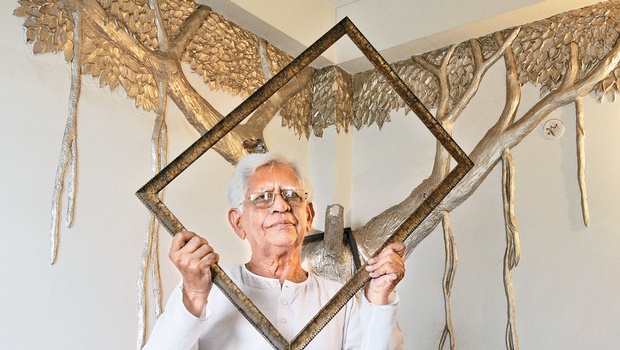
Seventy-four is just a number for Bhaskar Shewalkar, the septuagenarian veteran of Hyderabad as much as 109 is—all multi-lingual plays in Marathi, Hindi and Telugu within four decades, staged on countless stages all over the country by his company, Rangadhara Theatre Stream.
His repertoire is as vast as his accomplishments—translations, adaptations, experimental plays as well as conventional theatre. Now, Shewalkar is one of the curators of the city’s most sought after theatre venues, the Lamakaan—which is perhaps the Nizami answer to Prithvi Theatre of Mumbai—which has seen a dramatic surge in plays being staged by local and outstation groups, after it was launched as “an open, cultural space” in March 2010.
Presently, Shewalkar, is busy directing the Hindi adaptation of the Marathi work ‘Nata Samrat’ by noted writer Vi. Va. Shirwadkar (an adaptation of Shakespeare’s King Lear) which won him the Jnanpith Award in 1987. This will be staged in August at Hyderabad, Shewalkar’s 110th production.
Two things stand out in the impressive body of work that the doyen has put together during these years. First, he has been steadfast in maintaining propriety in respecting the intellectual property of the creators whose works he has adapted. He has put on stage no play without seeking the approval of the original writer. Flashing a letter written in French which authorized him to adapt the famed Samuel Beckett play Waiting for Godot in 1973, in which he played Godot, he says: “It did 12 shows” at a time when foreign adaptations were unheard of in Hyderabad. Secondly, even if it involves a token royalty, he has never defaulted on paying up.
The sweep of time has changed quite a lot, impacting events in its own way in the drama circuit of Hyderabad. In the 1970s, there were about 70 theatre groups of the Marathi community in Hyderabad, and it was not uncommon to have 15-20 of them putting up the works of literary giants. “We celebrated the centenary of Marathi theatre in 1943 in Hyderabad,” Bhaskar reminisces. Today, its presence is scanty, with just three or four diehard enthusiasts, including Shewalkar, espousing the cause.
Shewalkar is still busy carrying the priceless works from his mother tongue to the mainstream Hindi speaking audience; more than half his total plays staged are Hindi adaptations, played in the twin cities and elsewhere in India. “It is only the grey-haired, nostalgia-loving folks who still enjoy regional language theatre” Bhaskar sighs.
His group is known to have pioneered the absurd play concept, a grimmer version called black comedy. Their advertisements were unique. He remembers the ad campaign of his 1972 play ‘Ek Nari Char Brahmachari’ which ran thus: ‘Those who don’t laugh during this play will have their ticket money refunded’. There were no claims.
What gives Shewalkar the greatest pleasure of late is his pioneering work—a monologue called ‘Main Rahi Masoom’ which has succeeded beyond expectations. After being the only entry from Hyderabad to have been selected for the 12th Theatre Utsav (Bharat Rang Mahotsav) organized by National School of Drama out of the final 40 selected at the national and international levels, it will be on a global tour to UK and USA in August.
Theatre in Hyderabad, with maestros such as Shewalkar doing their bit with English adaptations and Hindi translations, is vibrant, truly alive and kicking. And it’s not a monologue.
source: http://www.newindianexpress.com / The New Indian Express / Home> Magazine / K. Naresh Kumar / August 30th, 2014